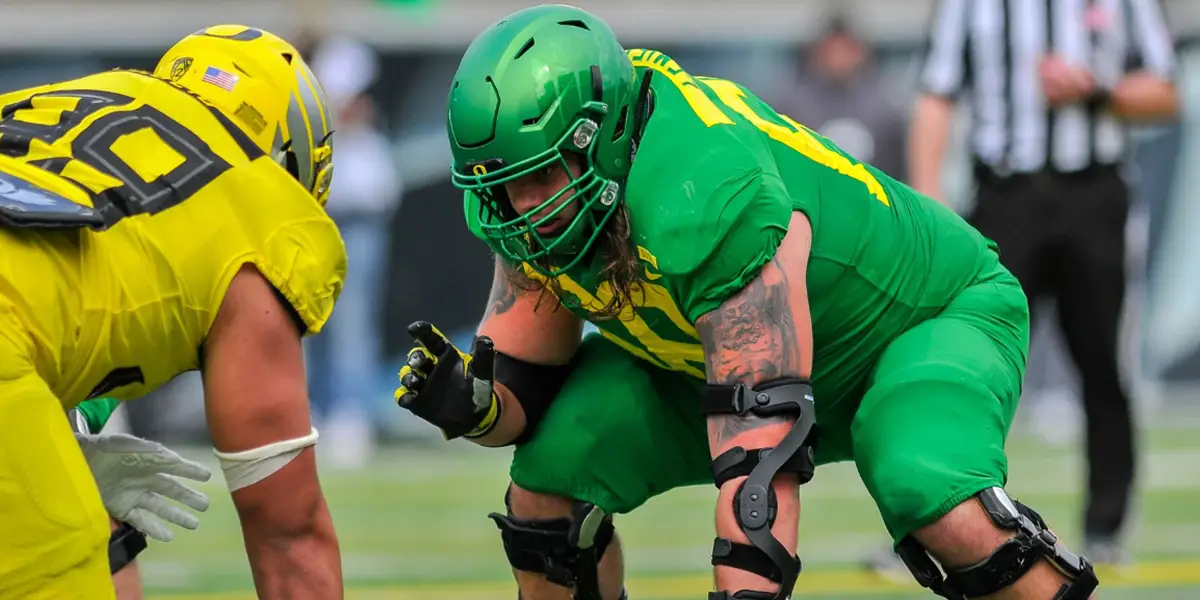Few things excite old-school football purists more than a well executed power run. The simple play encapsulates everything that they believe the game of football represents: strength, toughness, brute force and sheer determination. But there’s more to football than bone-crushing blocks and head-rattling collisions.
Someone should tell Mario Cristobal.
The Ducks’ coach is still under the flawed belief that straightforward power football is the surest path to a championship. If he doesn’t wise up soon, the Ducks’ offense will continue to be stuck in neutral while the rest of the country speeds past it.
Cristobal Wants to Create a New Identity
When Cristobal was hired as head coach of the Ducks, he made it clear that one of his primary goals was to instill a culture of strength and physicality.
It has been a dramatic shift. For years, the Ducks had been known for their speed and athleticism, and while those attributes led to some of the most prolific offensive seasons in school history, many believed that Oregon’s relatively light offensive lines and “finesse” style ultimately kept them from winning a title.
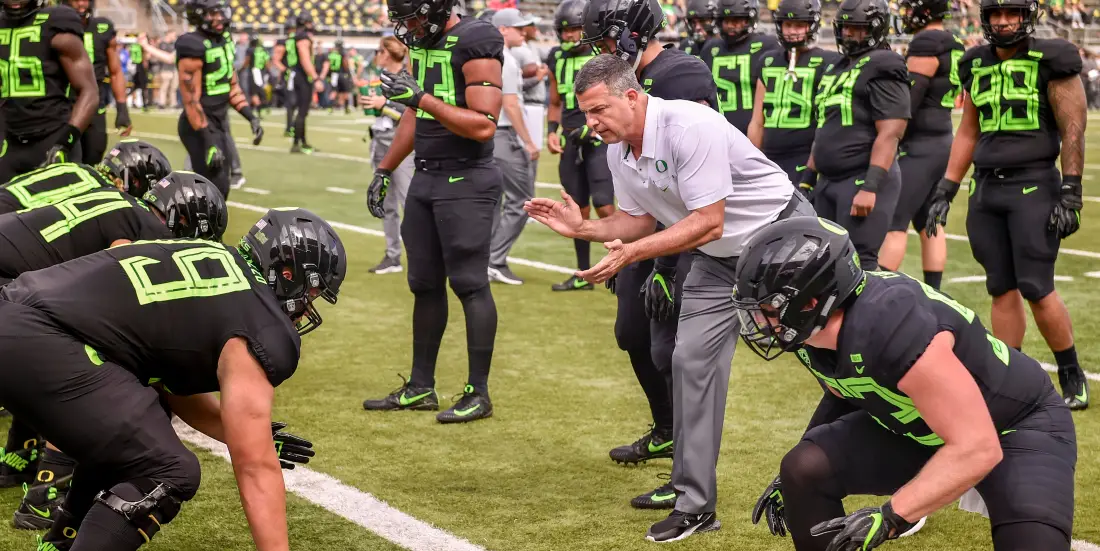
Cristobal loves power football.
On the other hand, Cristobal did win a title, under Nick Saban at Alabama. There, Cristobal’s offensive lines provided the foundation for a devastating rushing attack that propelled running back Derrick Henry to a Heisman trophy and the Crimson Tide to a national championship.
Having seen what it takes to win a title, Cristobal is looking to mold the Ducks in the Tide’s image. In an interview with 247sports, Cristobal said the following about his offense at Alabama:
“We maintained the principles of playing power football at the line of scrimmage, but with the tempo offense … The power, the counter, the inside and outside, the pin and pull schemes, your two-tight end stuff, your open stuff, all that stuff is power football, you are just doing it with tempo. We felt like we successfully combined it.”
Cristobal believes that power football, through a dominant, downhill rushing offense, is the way to win championships. While the Ducks don’t resemble traditional smashmouth offenses in the sense that they rarely employ a fullback and don’t run plays from under center, the central philosophy remains the same. Everything in the Ducks’ offense circles back to the foundation of physicality at the line of scrimmage.

The ultra-physical Henry is the prototype Cristobal running back.
But contrary to Cristobal’s beliefs, physicality is not the primary determinant of success. If champions were determined primarily by their physicality, then teams like Stanford, Wisconsin and Iowa would be regular playoff attendees.
There are more important factors that contribute to a top-level offense, and not even Alabama won strictly because of its strength at the line of scrimmage. While there’s nothing wrong with wanting a tough and powerful offense, it shouldn’t come at the expense of creativity and effective scheming.
Championship contenders take many different forms, and it’s dangerous to rely on a single strategy exclusively.
Versatility Is the Key to Success
Of course, being strong at the line of scrimmage is a benefit, and it undoubtedly makes life easier for an offense. But there are more effective ways to move the ball than by running three-yard dives into stacked boxes.
The best teams embrace a variety of schemes and philosophies to craft a multi-faceted offensive approach. There are times when running downhill is the best strategy, especially when a team has a clear talent advantage on the line of scrimmage. But other times, it’s more beneficial to attack the perimeter in order to get playmakers in space and away from the carnage in the middle of the field.
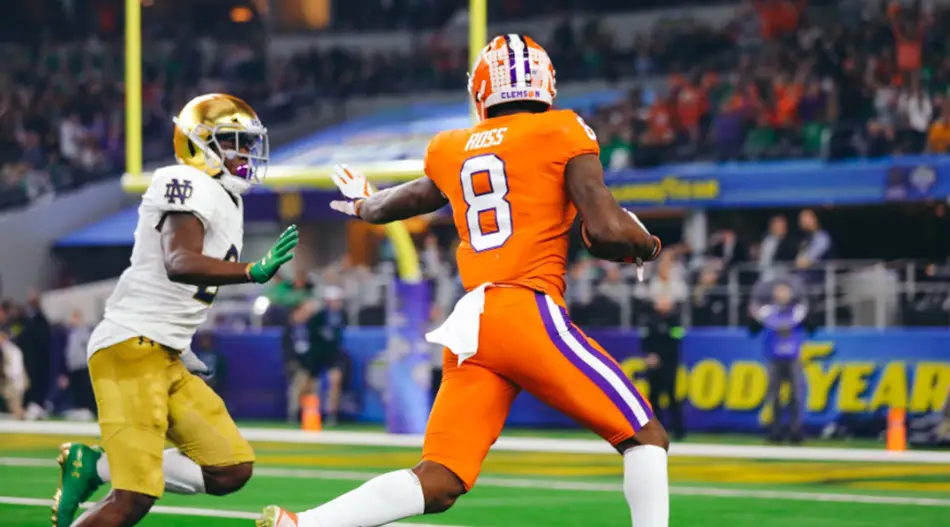
Clemson utilized playmakers like Justyn Ross when the situation called for it.
Today’s game is based on matchups. Good offenses tailor their schemes to capitalize on mismatches and play to the strengths of their personnel; they don’t stubbornly adhere to a philosophy out of principle.
Look at 2018’s national champion Clemson. The Tigers had one of the most productive rushing offenses in the country, but against Alabama, they didn’t try to prove their “toughness” by running into a ferocious front. Instead, they wisely spread out the defense and attacked the Tide’s smaller, less experienced cornerbacks with their own tall, athletic receivers. Their quarterback, Trevor Lawrence, was dynamite, and their receivers made plays all night long.
Were the Tigers the most physical team on the field? It’s debatable, but there’s no question that they were the smarter team. That’s why they were able to hand Saban his biggest loss ever at Alabama.
The Ducks Need to Mix It Up in 2019
Cristobal’s emphasis on physicality is indirectly killing Oregon’s offensive progress. The offensive staff is operating under the illusion that once the Ducks get more elite recruits up front, they will be able to beat most teams with a relatively simple approach: controlling the line of scrimmage and using a handful of basic rushing concepts to pound teams into submission.
Unfortunately, that philosophy is misguided.
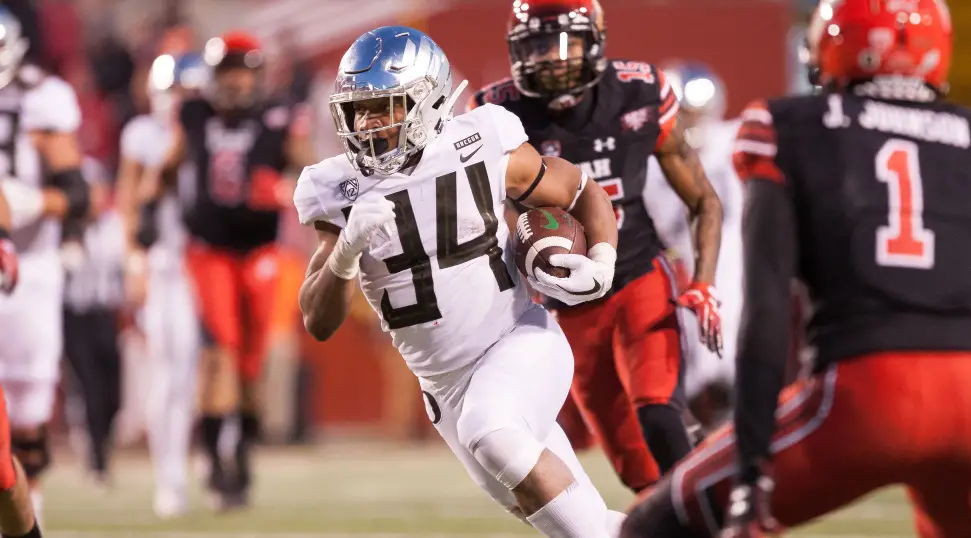
Players like CJ Verdell need the ball in space.
Teams like LSU and Michigan have already tried that formula, and they’ve both been playing second fiddle to two other teams (Alabama and Ohio State) in their respective conferences that have embraced offensive ingenuity and multiplicity. If the Ducks want to avoid the same fate, they need to evaluate their roster and develop a strategy that both optimizes the strengths of their personnel and is flexible enough to attack defenses in a number of different ways.
There’s no shame in expanding the playbook. It’s not a sign of weakness to run a jet sweep as opposed to an ISO dive. It’s smart coaching. With the athleticism of the Ducks’ skill position players, it would be wise for the coaching staff to find ways to get them the ball in space rather than to continuously beat a dead horse by running sub-200-pound running backs into crowded piles.
Many point to the pistol formation as the root of the Ducks’ offensive problems, but there are, and have been, explosive offenses that have utilized the formation successfully. Nevada famously had some of the best rushing offenses in the country under the pioneer of the pistol, Chris Ault. More recently, Ohio had one of the most lethal offenses in the Group of 5 utilizing the formation, finishing 16th last year out of 130 FBS teams in Football Outsiders’ S&P+ offensive ratings.
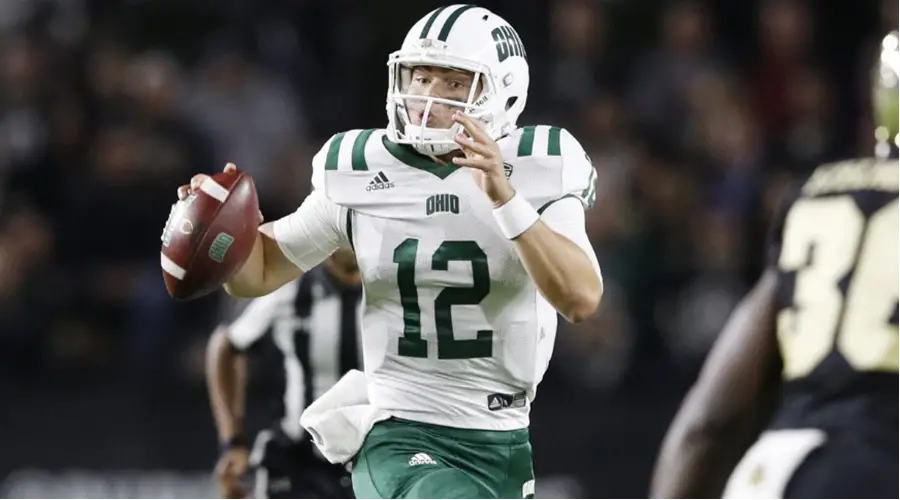
Nathan Rourke piloted a very effective, pistol-centered Ohio offense in 2018.
The difference between those offenses and the Ducks’ current group is that both Nevada under Ault and Ohio in 2018 used a variety of read option schemes and perimeter-stretching plays like the speed option to give their playmakers one-on-one opportunities with lots of open field in front of them. The Ducks want to protect their star quarterback, so they’ve scaled back their option packages significantly.
But that’s not an excuse to neglect the edges and play in a phone booth. Even without reading defenders, Oregon can afford to spread the field to clear the box and run outside zones, sweeps and even tosses, plays that former Oregon coaches used to craft historic rushing offenses. Instead, the Ducks have reduced the pistol, a formation that opens the door for plenty of unique plays, to its most basic form, negating its advantages by using it as nothing more than a medium to gain two to three yards at a clip.
If Cristobal is able to accept the fact that power football needs more creative scheming to bring the Ducks a championship, then maybe their offense will evolve past the insipid state that it’s in.
Joshua Whitted
Morgantown, West VirginiaTop Photo by Kevin Cline
 Bob Rodes, the FishDuck.com Volunteer editor for this article, is an IT analyst, software developer and amateur classical pianist in Manchester Tennessee.
Bob Rodes, the FishDuck.com Volunteer editor for this article, is an IT analyst, software developer and amateur classical pianist in Manchester Tennessee.
Related Articles:
Oregon Football: Early 2026 Ranking Projections
FishDuck Foaming Over Upside of 2026 Diamond Ducks
Unbelievable...Same SEC Stuff, Different Day
Why Oregon Football Always Belongs in the National Conversation
The B1G Won the 2026 Coaching Carousel...Big-Time!
Continuity? Lanning's Hiring Success is Put to the Test
Joshua is an adopted Duck fanatic, originally hailing from southwestern Pennsylvania. His love for the University of Oregon began as a young child when he became mesmerized by the flashy uniforms and explosive offenses of the Chip Kelly era, and now, he follows the team religiously. His fondest memory of the team is seeing De’Anthony Thomas race past Wisconsin defenders back in the 2012 Rose Bowl. A true football enthusiast, Joshua loves studying the intricacies of the game, and he aspires to become a professional sports journalist. Joshua now resides in Morgantown, West Virginia where he works in customer service. When he’s not watching Oregon replays, Joshua loves reading, writing, and spending time with his family. Contact: whittedjd@gmail.com

